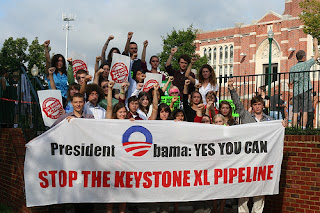
Anthropocene: the debatable new geological age marked primarily by the influence of mankind over nature.
This article in
The Economist, "A man-made world," focuses on the changing forces on the earth. The enormous amount of humans on the planet, as well as the surging technology, may mean that geoengineering may be the best way to reckon the relationship between humans and the environment.
"The Holocene never supported a civilization of 10 billion reasonably rich people, as the Anthropocene must seek to do, and there is no proof that such a population can fit into a planetary pot so circumscribed. So it may be that a “good Anthropocene”, stable and productive for humans and other species they rely on, is one in which some aspects of the Earth system’s behavior are lastingly changed."
But what exactly does that mean, in terms of how we look at environmentalism and energy production? According to the article, this isn't the first time we've tried and succeeded at changing a significant way in which the earth operates (19th century brought the first attempt at geoengineering the planet, this time to regulate nitrogen levels).
"Better to embrace the Anthropocene’s potential as a revolution in the way the Earth system works, they argue, than to try to retreat onto a low-impact path that runs the risk of global immiseration."
Let's be honest here. The science is over my head. But what this article brings to light is the idea that in looking at the earth and its ecosystems, you can't consider it as it was without the influence of humans and technology. One must consider and "change the paradigm" in order to really understand what the earth should be like with humans on the planet, using the land, and whether we are doing it justice. They argue for an influx of geoengineering in order to right our wrongs. But what does that mean for hot-button issues like the proposal of the Keystone XL pipeline and tar sand mines in Utah?
When asked what the place of nature is in the age of Anthropocene, Dr. Erle Ellis maintained the importance of environmentalism in our decision making. We just have to reconsider how we think of it. We as humans in the Anthropocene are permanently intertwined to nature from this point on. As he says, "Nature is something that we create; no longer is nature what creates us... There isn't anything left that hasn't been touched by us. Nature is something that is sustained and it's our job to sustain it."
(Click picture for the full article.)



































